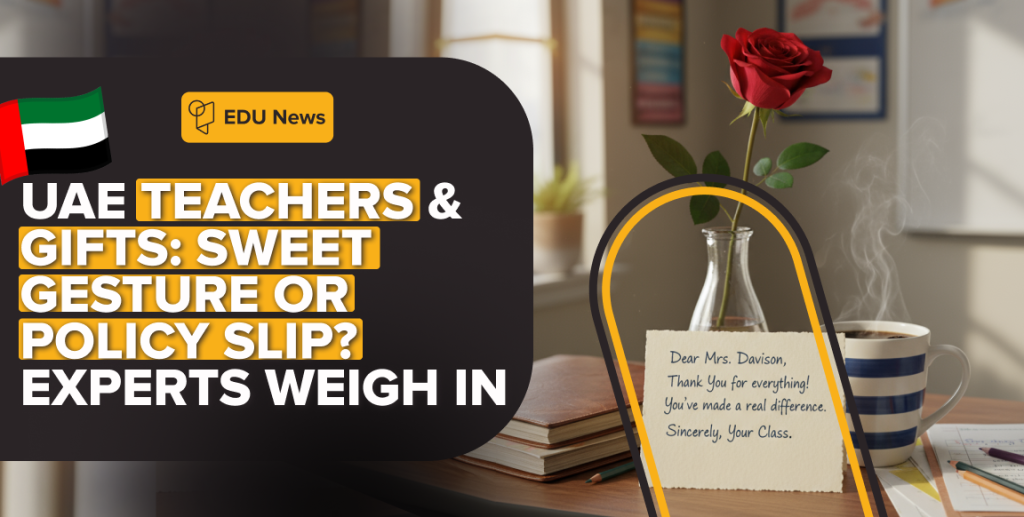A rose says “thank you.” A designer handbag says “see you at the HR office.”
In the UAE, a simple gesture of gratitude can blur into a rule-breaking act and schools are making sure parents know the difference.
The Debate: Sweet or Sticky?
Every festive season, UAE classrooms light up with more than decorations. Parents brainstorm how to show appreciation: group gift cards, class-funded hampers, or surprise presents for a favourite teacher.
But the Ministry of Education’s new professional and behavioural standards remind educators and families that accepting gifts from parents or students is a second-level violation. That’s one step below serious misconduct.
The policy aims to protect teachers from undue influence, keeping classrooms professional and fair. But parents argue that gratitude, especially in cultures where gift-giving is tradition, shouldn’t feel like a crime.
Drawing the Line: What Schools Say
Abhilasha Singh, principal of Shining Star International School in Abu Dhabi, keeps her staff firmly on the safe side.
“Teachers are advised not to accept gifts from parents. Anything expensive, bags, jewellery, luxury items is a clear violation. Even I return such gifts if offered.”
Her school does allow small tokens of love: a single rose, a chocolate, a handwritten card. She says, “They don’t compromise professional integrity.”
At Woodlem Park School Hamidiya in Ajman, principal Shiny Davison takes a similar stance.
“Flowers, small crafts, and appreciation letters are acceptable. Anything of monetary or significant value is politely declined and reported. Teachers are reminded through staff meetings and HR circulars.”
Both leaders agree: clarity is kindness. Transparent policies help teachers avoid awkward refusals and parents avoid embarrassment.

Parents Speak: Gratitude vs. Pressure
Not every parent sees gift-giving as a problem. Sofía Martínez (name changed), a Dubai parent, enjoys contributing to a collective year-end gift.
“It’s a simple way to show appreciation. We pool a modest amount, and participation is optional.”
Others feel the custom can spiral. Karen Fernandes recalls a mid-year collection for a teacher’s new baby, on top of holiday and year-end gifts.
“It felt a bit excessive. Appreciation should never become obligation.”
This tension between heartfelt thanks and social pressure fuels the ongoing debate.
Cultural Context: A Balancing Act
The UAE is home to over 200 nationalities, each with unique traditions around gratitude.
- In many Asian cultures, gift-giving is a sign of respect.
- Western parents might prefer handwritten notes or verbal thanks.
- Arab families often value generous hospitality.
Education experts say policies must respect cultural diversity while ensuring professional fairness. The MoE’s guidelines aim to strike that delicate balance.
Safe Ways to Say “Thanks”
Want to celebrate a teacher without risking a policy breach? Here are school-approved ideas:
Low-Cost, High-Heart
- Handwritten thank-you cards
- DIY crafts from students
- A collective class video or poem
Community-Driven
- PTA-organised appreciation days
- Planting a tree or class garden in the teacher’s honour
- Charity donations in the teacher’s name
Words That Matter
A thoughtful letter from a parent or student often carries more emotional weight than any expensive gift.
Why the Rules Matter
It’s not about dampening kindness, it’s about protecting trust.
Clear boundaries prevent:
- Favoritism: Avoids the perception that gifts influence grades.
- Pressure: No parent feels forced to match another’s generosity.
- Awkwardness: Teachers stay focused on education, not etiquette.
As Singh sums it up:
“Our goal is to keep relationships professional, respectful, and free from obligation. Appreciation is beautiful, but integrity comes first.”






















